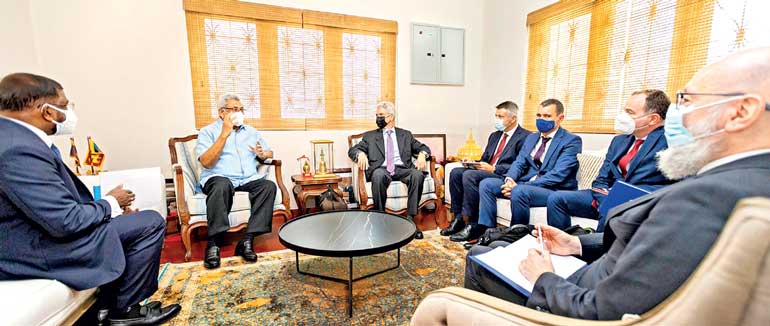Monday Feb 16, 2026
Monday Feb 16, 2026
Tuesday, 5 October 2021 02:21 - - {{hitsCtrl.values.hits}}

President Gotabaya Rajapaksa gestures during his discussions at his private residence at Mirihana with the visiting EU delegation reviewing the progress of Sri Lanka in terms of the GSP+ scheme
President Gotabaya Rajapaksa yesterday set the record straight on a host of domestic initiatives towards reconciliation and equitable development to the visiting European Union (EU) delegation to review Sri Lanka’s progress in terms of the GSP+ program.
Soon after his arrival from the US, the President met the five-member EU team on their last day of the week-long visit.
According to a statement issued by his media team, the President had informed the EU delegation that as the oldest democratic country in the region, which has never been under a dictatorship or an authoritarian regime in any period of its history, Sri Lanka will provide solutions for issues through a democratic system.
The delegation arrived last week to review Sri Lanka’s compliance with the agreements Sri Lanka has already committed to adhering to under the EU GSP+ regime, its co-operation with Sri Lanka and the European Parliament’s views on Sri Lanka.
During its week-long stay, the delegation is scheduled to meet Government and private sector representatives, civil society, trade unions before submitting a report to the European Parliament.
The EU representatives, who paid special attention to the Prevention of Terrorism Act (PTA), pointed out the need for a timeline-based solution. The delegation said that a formal report based on the findings of the visit would be submitted to the European Commission and the European Parliament.
The President said that the necessary committees had been appointed and the Justice Minister and the Attorney General had been instructed according to the reports of the Committees and immediate steps would be taken to amend the necessary provisions of the Prevention of Terrorism Act.
President Rajapaksa also stated that the country would abide by the agreements on human rights in the world today.
The visit of the delegation is following the EU Parliament in mid-June adopting a resolution calling on the EU Commission to consider temporary withdrawal of Sri Lanka’s GSP+ status and the benefits that come with it, noting the Government’s persistent failure to adopt and enact human rights reform and repeal the draconian Prevention of Terrorism Act (PTA). The Resolution on Sri Lanka was adopted with 628 votes in favour, 15 against and 40 abstentions.
During its week-long stay, the delegation met Government and private sector representatives, civil society, trade unions before submitting a report to the European Parliament early next year. It assessed Sri Lanka’s compliance with 27 international conventions related to GSP+, including human rights, labour, environment and good governance.
At the discussions yesterday the President also pointed out the impact of COVID-19 on the economy and the obstacles that the Government faced in fulfilling its expected comprehensive strategies. He explained the steps taken by the Government despite this situation to address many of the problems caused by the prolonged war and to establish democracy as well as to carry out development in the North and East. During the discussion, it was also pointed out the steps that have been taken to provide relief to the families of the missing persons and to pay compensation to the families of victims.
The President also stated that even at the UN General Assembly, he stressed the need for the Tamil political parties, members of the Tamil Diaspora and all expatriates to work together to resolve the country’s internal problems and take the country forward.
The President said that he is working with civil society organisations with a mutual understanding and that their support would be sought for the reconciliation process and development in the country.
It was pointed out that instructions have been given not to use batons, water cannons or tear gas to control any of the protests during the last two years and that a separate area has been allocated for protests in front of the Presidential Secretariat.
Though the Government acted in a democratic manner, the President said that the attention has not been paid to them and it was unfortunate that various parties spread misconceptions based on a minor incident.
Rajapaksa pointed out that steps are being taken to ensure that the public and private sectors are working together, to enhance the private sector in order to contribute better to the development of the country, and to adopt the technological strategies of developed countries for a quality public service.
The President explained the potential to achieve economic development of the country by obtaining technical and training assistance for the development of agriculture, the country’s main livelihood.
The delegation thanked and commended the President for his in-depth explanation of the Government’s plan to take the country forward.
EU is Sri Lanka’s second biggest trading partner and second main export destination, absorbing 22.4% of Sri Lankan exports.
Sri Lanka’s exports to the EU, excluding the UK, in the first eight months grew by 32% to $ 1.88 billion out of $ 7.8 billion in total exports. Textiles and clothing exports to the EU have benefited most through the GSP+ concession, accounting for over 60%, followed by food products with over 12%. Sri Lanka has duty-free access to 7,200 products with the EU GSP+ concession. The apparel industry has said the EU GSP+ status is important for exports.
European Commission GSP/EAP Directorate-General for Trade, Senior Advisor – Trade and Sustainable Development Nikolaos Zaimis, European External Action Service Head of South Asia Division Ionnnis Giogkarakis Argyropoulos, European Union Delegation in Colombo Ambassador Denis Chaibi, GSP Trade Preferences Coordinator Guido Dolara, Directorate-General for Employment, Social Affairs and Inclusion, Labour Mobility and International Issues Head of Unit Lluis Prats, Policy Officer for Sri Lanka and Maldives Monika Bylaite, and Foreign Secretary Admiral Jayanath Colombage were present at the meeting with the President.